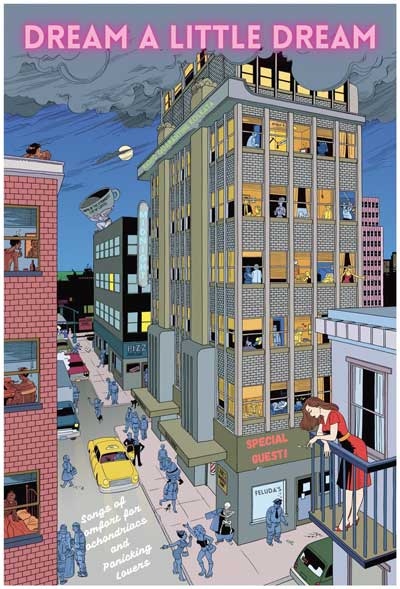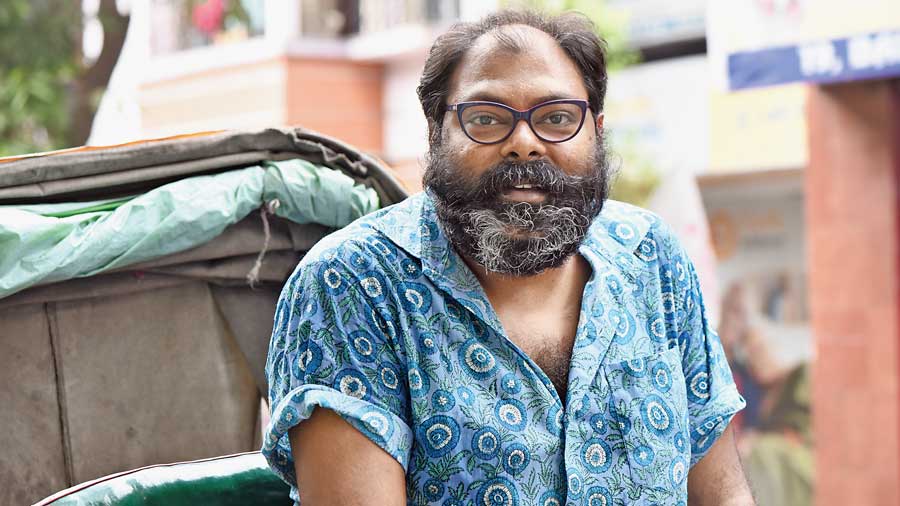It is a slightly wild journey into the night. The show is called Songs of Comfort for Hypochondriacs and Panicking Lovers and is broadcast on Saturdays from around midnight on Radio Quarantine Kolkata.
You don’t know what you will encounter when you tune in. The episode ‘Burnt out ballads’ begins with the American commentator Fran Lebowitz saying New York was better in the Seventies not only because she was in her twenties. It was less boring. “Also, you could smoke.” Next Motown legend Marvin Gaye stirs the soul with Right On, a frequent listener is wished on his birthday by Beethoven, Bach, Mozart, “et cetera, et cetera, et cetera”, a phrase that seems to have a particular resonance, and the birthday music climaxes in Come Closer from Kasam Paida Karne Wale Ki, a Mithun Chakraborty revenge classic from the Eighties. The raunchy number was composed by Bappi Lahiri and sung by Salma Agha, who was also the actor in the film, trying to pull off a seduction in a sailor suit with it. What the night can reveal.
A haunting jazz piece by Dexter Gordon is followed soon by a reading from an essay by Gandhi on Jews in Palestine, then Filhos de Gandhi sung by Jorge Ben and Gilberto Gil with a request to enjoy the song and “f*** Israel!”
The voice creating this chaos, which has a dedicated fan following and is quite satisfying, belongs to RJ Bishakto Chochchori, whose slow, meandering but chuckling voice does its bit for the show. Songs of Comfort, which has just broadcast its fiftieth episode, is his show. Bishakto means poisonous and chochchori is another untranslatable Bengali word, roughly meaning a mishmash of vegetables. During the day Bishakto Chochchori goes by the name of Sudipto Sanyal, 37, academic and writer, with a Ph.D. from Bowling Green State University on the “Poetics of the Intoxicated Narrative: Drugs, Detection, Denouement”. But heavily into music and a fan of the show Frasier, which is about a radio psychotherapist, he had all along nursed a little desire of having a radio show of his own.
So when Sanyal was asked by Radio Quarantine Kolkata to start a show, he agreed readily. The radio (https://www.facebook.com/RadioQuarantineKolkata/) was set up in March 2020 as a zero-budget Internet radio by a group of filmmakers, teachers and activists as an attempt at creating a sense of togetherness against the physical isolation forced by lockdown. “Ekaki theko na asamaye,” is the radio’s message. It offers a range of programmes, conversations, readings, music and a children’s segment, and is also a platform against the politics of communalisation, particularly the Citizenship Amendment Act (CAA) and the National Register of Citizens (NRC), which the Centre has been pressing during the pandemic.
“For Radio Quarantine my only condition was that my show had to be at midnight,” says Sanyal. The first episode of Songs of Comfort was broadcast only days after Radio Quarantine Kolkata started.

A poster for an episode of the show
The name of the show was easy. “At that time people were terrified and my partner and I were discussing how lucky we were that we lived close to each other.” Hence the hypochondriacs and panicking lovers, but of course the show is also open to insomniacs and the just plain lonely everywhere. And though he plays cutting-edge music from everywhere in the world, Sanyal manages to keep his show unesoteric and unsnooty, and great fun for every listener.
Bishakto Chochchori was a name borrowed from the Calcutta quizzing circuit, of which he was a part both as a student of Calcutta Boys’ School and the English department of Jadavpur University, Calcutta,
“I chose midnight because fewer people would be awake then,” says Sanyal. He is not much visible on social media as he is against “surveillance capitalism”. He likes his limited virtual presence and does not upload too many recordings of the show online for another reason. “I like people to listen to the programme in real time,” he says. “It becomes a diffused listening party.” He is aware that some people are listening to him, in distant parts of the world, including in Hawaii, but he does not know how many, or how popular his show exactly is, and it does not matter. “As long as one person is listening, I am happy,” he says. He is also happy if someone falls asleep listening to the music. Then the music has done its job; it has brought sleep.
“I do whatever I want to,” says Sanyal. Each episode is pre-recorded, sometimes with just a few minutes to go, sometimes it is even late by a few minutes, which establishes “a kind of anti-professional elasticity”. An episode can go on as long as he wants it to, which is usually around three hours. “But the fiftieth episode went on for almost six hours,” he laughs. He once played a song, Les Amis by Francois de Roubaix, eight times in an episode. Each episode is strung around a theme, such as food, or surveillance, or water, or dreams, but only loosely, and comes with a bright, sly pop-artish poster designed by Sanyal himself. “I usually have not done genres as themes, except in episode 49, which was on Doo Wop.” It is his favourite episode.
He responds particularly to music with “cross-cultural sounds, rather than straight up folk music”. He loves jazz and tries not to overdo it, electronica, especially early electronica, psychedelic. And he works on getting the music from everywhere. So you can expect Habibi funk, Vietnamese hip hop, Japanese pop and a load of music from Brazil, Sanyal’s favourite place, “for football, jazz, music and resistance”.
“Rebellion is attractive,” he says. Especially when music is added to it, music which has soul, and that does not only mean the genre.
And all this is very welcome at midnight, which can be the hour of desertion, something beautiful women on glass slippers know too. We are also waiting for Bappi Lahiri’s Lovers, Night Lovers.
